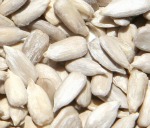Is Nut Allergy Driving You Nuts?

Nut allergy is often the most severe out of all allergies. Allergy symptoms are the fastest to reveal themselves. And anaphylactic shock (see below) is most common with nut allergy compared with other allergy types. Allergy to nuts is also the most long-lasting one.
Allergy to nuts is associated with the highest number of fatal outcomes. That is why it is extremely important to early diagnose the allergy and proactively avoid any contact with a potential allergen.
Nut allergies are triggered but peanuts and tree nuts (almonds, cashews, hazelnuts, Brazil nuts, chestnuts, macadamia nuts, pecans, pine nuts, walnuts, pistachios).

I will also talk about seed allergy (sesame, mustard, flax, poppy, sunflower seeds) in this section. Seed allergy is not very common, but it is on the rise.
People allergic to nuts face a higher risk of having soy allergy as well.
Peanuts are not nuts, but legumes, similar to beans and peas. We mention peanuts in relation to tree nut allergy, because peanut proteins are very similar in structure to the proteins of tree nuts. Therefore, people with nut allergy are allergic to peanuts too.
Nut and seed allergies occur when our immune system treats nuts and seeds (nut and seed proteins) as foreign bodies and produces antibodies (Immunoglobulin E) to fight the allergens. As a result allergic reactions start. Visit Allergies section to read more.
Allergic reaction can occur in response to consuming or touching the allergen or inhaling the fumes from the allergen.
It is wise to avoid foods that have “may contain nuts”, “may contain traces of nuts”, “produced in a facility that also produces products containing nuts” or any other label of this nature. Even a tiny trace of nuts is enough to trigger severe reactions.
Nut Allergy Symptoms:
- Rash
- Hives
- Itchy, watery eyes
- Difficulty breathing
- Nasal congestion
- Coughing
- Diarrhea
- Constipation
- Irritable bowel syndrome
- Indigestion
- Vomiting
- Anaphylactic shock
Anaphylactic shock (collapse) is a very severe life-threatening allergic reaction. Symptoms develop very fast and medical assistance should be sought immediately.
Most common symptoms are swollen face and throat, hives, abdominal pain, vomiting, diarrhea, low blood pressure. First aid should be an adrenaline injection. If your baby had anaphylactic shock as a reaction to nuts or seeds, analyze his/her surroundings carefully to eliminate potential triggers. Avoid the allergens going forward.
If your baby’s lips, tongue, face are swollen, and he/she has trouble breathing or swallowing, call 911.
Breastfeeding and Nut Allergy
If you have a family history of allergies or if a nut or seed allergy is suspected in your baby, breastfeeding is a must.
Our immune system treats every object that comes in contact with us as a foreign body. As our immune system matures it learns to accept most of the “foreign” bodies. So if your baby is prone to allergies, the later he/she comes in contact with a potential allergen, the better the chances that the immune system will react normally to it.
Most nut allergies are never outgrown, but some are. By breastfeeding your baby for as long as you can, you increase his/her chances of living allergy-free!
Nut and seed
allergy can be tested with a blood or a skin test. Start an elimination diet if
you notice allergy symptoms in you or your baby. Eliminate nut and seed products for
two- three weeks and see if the symptoms go away. Even if they do, do NOT
re-introduce nuts in your diet. Talk to your doctor first. Allergic reactions
to nuts often increase in severity with every exposure. Visit Allergy Testing section to read more.
Your doctor will probably recommend you carrying an EpiPen (an epinephrine auto-injector), if your allergic reaction is severe.
Cooking at home is important for people allergic to nuts and seeds. It is the best way to avoid allergenic products. Nuts and seeds can be found in so many unexpected foods, that it is difficult to be certain when eating out or buying ready-made meals that they are nut- and seed-free. Your best option is to buy ingredients in their most raw and natural form and cook at home.
Beware of cross-contamination. Make sure you clean all the utensils thoroughly after cooking dishes with nuts or seeds. If you need to have nut- and seed-containing products in your fridge, make sure they are kept separately from the non-allergenic foods.
Nut Allergy Food Facts
If you or your breastfed baby is confirmed to be allergic to nuts or seeds, here is what you need to know:
- People allergic to peanuts may show cross-reactivity to soy, kidney, lima, pinto, garbanzo and string beans, bean sprouts, peas and lentils
- If you are allergic to cashews, you are most likely to be allergic to pistachios and mango
- Nut oil and nuts can be present in salad dressings, sauces, pesto, butters, mustard, curries, hummus, tahini, halvah
- Nuts and seeds are used to garnish salads, seafood
- Many breads, granola bars, cereals, energy bars, candies, muesli contain nuts and seeds
- Processed meats and sausages may contain nuts
- Many desserts and baked goods (cakes, ice-cream, nougat) contain nuts
- Some alcoholic drinks (liqueurs) contain nuts. Beware of foods flavored with liqueurs. Visit Food Avoidance section to read more about alcohol consumption while breastfeeding.
- Avoid any food containing the name of the nut in its name (peanut butter, almond extract)
- Hydrolyzed plant or vegetable protein, vegetable fats and oils, flavorings may be made with nuts
- Some foods are coated with crashed nuts before frying or baking
- Nuts and seeds are widely used in Asian and Mediterranean cuisines
Important: Refined nut oil is considered safe in terms of allergies. The process of refining is supposed to remove nut proteins from the oil. However, some people may react to tiny traces left behind. Take caution when consuming foods with nut oil.
Read the labels carefully to rule out any nut and seed products from your diet. Keep in mind that seeds are not common allergens, and therefore, the labeling laws for foods containing seeds are not so strict. Use common sense when shopping. Avoid foods that might contain nuts and seeds even if the label doesn’t clearly say so.
Make sure people you deal with on a daily basis are aware of your allergies. Instruct your baby’s care-giver of allergy dos and don’ts.
Even
with all these adjustments to your normal lifestyle, breastfeeding makes sense. It is the
only way of prolonging your baby’s allergy-free living. Let him/her enjoy it
for as long as possible! Read my story here.
There are many ways to show your love and devotion to your kids and to win their trust. Breastfeeding is the most natural one.
Yours,
Viktoriya
Back to top of Nut Allergy>Food Allergies>Breastfeeding Home










